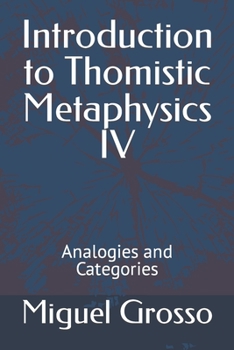Introduction to Thomistic Metaphysics IV: Analogies and Categories
I am delighted to present the fourth volume in the series titled Introduction to Thomistic Metaphysics. This book delves into two pivotal topics: the doctrine of Analogy and Categories. Aristotle, a trailblazing philosopher, was the first to apply analogy (originating from mathematics) to Metaphysics, resulting in significant epistemological advancements. This development paved the way for Heidegger to assert that Aristotle had established Metaphysics on an entirely new foundation compared to Platonism. Analogy serves as the method of knowledge that enabled Aquinas to transcend human reason and explore the mysteries of the supernatural order. In this regard, he surpassed Aristotle, who could not progress beyond "Being-in-entity." Aquinas skillfully advanced towards God through analogy, identifying "Being-in-itself" as subsistent Being in God Himself-distinct from an entity. Turning to Categories, we delve into the study of substance and predicamental accidents. While Aristotle emphasized the close entity-substance connection, even equating entity with the first substance, St. Thomas introduced his unique perspective. He recognized that it's the act of being or existing (esse) that brings substantial essence to life by perfecting it, imparting existence, and allowing it to transition from mere extramental existence to tangible reality. Aquinas thus advances beyond Aristotle's essentialist Metaphysics to an existential Metaphysics-one where essence exists in concrete reality. In this volume, I have omitted a Prologue as I found it redundant. Instead, I launch directly into the content, organized into 17 chapters, as follows: 1-What is analogy? 2-Analogy of attribution. 3-Analogy of proportionality. 4-Analogy of inequality. 5-The properties of analogy. 6-The analogical knowledge. 7-The analogical notion of being (or of entity or of "being a being). 8-The categories. 9-The substance (I). 10-The substance (II). 11-The accidents. 12-The quantity. 13-The principle of individuation. 14-The quality. 15-The relation. 16-Other accidents. 17-The human person. Finally, the book concludes with an Epilogue in the form of question-answer sessions and a section dedicated to Notes. As is customary, I have incorporated numerous quotations and references from esteemed authors to enrich the content.
Format:Paperback
Language:English
ISBN:B0BM42F12Q
ISBN13:9798363264542
Release Date:November 2022
Publisher:Independently Published
Length:124 Pages
Weight:0.39 lbs.
Dimensions:0.3" x 6.0" x 9.0"
Related Subjects
PhilosophyCustomer Reviews
0 rating





